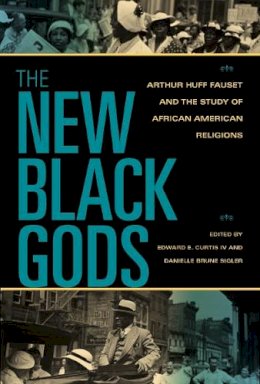
The New Black Gods. Arthur Huff Fauset and the Study of African American Religions.
. Ed(S): Curtis, Edward E., Iv; Sigler, Danielle Brune
Taking the influential work of Arthur Huff Fauset as a starting point to break down the false dichotomy that exists between mainstream and marginal, a new generation of scholars offers fresh ideas for understanding the religious expressions of African Americans in the United States. Fauset's 1944 classic, Black Gods of the Metropolis, launched original methods and theories for thinking about African American religions as modern, cosmopolitan, and democratic. The essays in this collection show the diversity of African American religion in the wake of the Great Migration and consider the full field of African American religion from Pentecostalism to Black Judaism, Black Islam, and Father Divine's Peace Mission Movement. As a whole, they create a dynamic, humanistic, and thoroughly interdisciplinary understanding of African American religious history and life. This book is essential reading for anyone who studies the African American experience.
Product Details
About . Ed(S): Curtis, Edward E., Iv; Sigler, Danielle Brune
Reviews for The New Black Gods. Arthur Huff Fauset and the Study of African American Religions.
ChoiceL. H. Mamiya, Vassar College, October 2009 "This reappraisal of Fauset becomes a reappraisal of how to study African American religions, which makes this volume a must for anyone interested in this field." —Nova Religio "... a fantastic new collection of essays on Arthur Huff Fauset and African American religious traditions." —Phillip Luke Sinitiere, Religion in American History (blog), May 4, 2009 "The editors of this fine collection of essays have resurrected the influence and importance of Arthur Fauset's classic study....
Choice" —, October 2009 "Overall, the essays in this collection offer a fresh, thoughtful look into African American religious communities outside of the Christian mainstream.... [T]his is a commendable collection that should encourage and inform subsequent study." —American Historical Review, 116.1 February 2011 "This well-conceived book extends Fauset’s respect for religious differences and his laudable refusal to indulge in grand, but inaccurate generalities." —Keith D. Miller, Arizona State University Tempe, Arizona, JOURNAL OF AMERICAN HISTORY, Vol. 97. 1 June 2010
